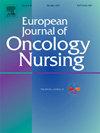Demoralization and sleep in breast cancer: A casual and computer-simulated network analysis
IF 2.7
3区 医学
Q1 NURSING
引用次数: 0
Abstract
Purpose
There is evidence in studies with patients diagnosed with breast cancer that suggests demoralization, which is described as a sense of hopelessness and inability to cope, is associated with a decline in sleep. However, there are limited studies that fully explain the association. The purpose of this study was to further explore demoralization and sleep in patients.
Methods
In the "Be Resilient to Breast Cancer" study, self-report data were collected on sleep and demoralization. Sleep was measured with the Pittsburgh Sleep Quality Index for a total sleep quality score and 7 sleep domains. The Demoralization Scale provides 16 items. Gaussian network analysis was employed to identify core symptoms and bridge symptoms. A Bayesian network was used to examine how these symptoms are causally related to each other. Computer-simulated interventions were used to identify targets for intervention.
Results
The distress item of the Demoralization Scale was the core symptom (Str = 1.17, Bet = 52, Clo = 0.003), while the daytime dysfunction domain of sleep was considered the bridge symptom. Sleep quality was the key parent node. Computer-simulated intervention suggests targeting distress and loss of emotional control.
Conclusions
Sleep may contribute to demoralization from the findings of casual networking analysis. Distress and loss of emotional control should be targeted to decrease the adverse interaction with sleep.
乳腺癌的士气低落和睡眠:一项随机的计算机模拟网络分析
目的在针对乳腺癌患者的研究中,有证据表明,被描述为绝望感和无力应对感的意志消沉与睡眠质量下降有关。然而,能够充分解释这种关联的研究还很有限。本研究的目的是进一步探讨患者的意志消沉和睡眠问题。方法 在 "乳腺癌抗击力 "研究中,收集了有关睡眠和意志消沉的自我报告数据。睡眠采用匹兹堡睡眠质量指数(Pittsburgh Sleep Quality Index)进行测量,包括睡眠质量总分和 7 个睡眠领域。士气低落量表提供了 16 个项目。采用高斯网络分析来确定核心症状和桥接症状。贝叶斯网络用于研究这些症状之间的因果关系。结果去士气量表中的痛苦项目是核心症状(Str = 1.17, Bet = 52, Clo = 0.003),而睡眠的日间功能障碍领域被认为是桥接症状。睡眠质量是关键的父节点。计算机模拟干预建议以苦恼和情绪失控为目标。应针对苦恼和情绪失控进行干预,以减少与睡眠之间的不良影响。
本文章由计算机程序翻译,如有差异,请以英文原文为准。
求助全文
约1分钟内获得全文
求助全文
来源期刊
CiteScore
4.40
自引率
3.60%
发文量
109
审稿时长
57 days
期刊介绍:
The European Journal of Oncology Nursing is an international journal which publishes research of direct relevance to patient care, nurse education, management and policy development. EJON is proud to be the official journal of the European Oncology Nursing Society.
The journal publishes the following types of papers:
• Original research articles
• Review articles

 求助内容:
求助内容: 应助结果提醒方式:
应助结果提醒方式:


